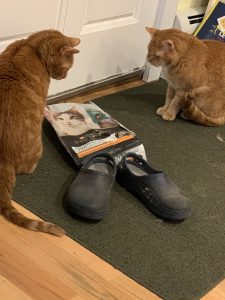Happy February! Tomorrow is Imbolc, the midpoint between winter and summer. Of Celtic origin, the name means “in the belly of the Mother” because the seeds of spring are germinating in Mother Earth.
At Reiter’s Block, every day is trans awareness day. EA Games came out with an update to The Sims 4 yesterday to make my favorite game even queerer:
Top Surgery Scar
Under the same Body category, all players can find a Body Scars category with an option for Teen and older male Sims (masculine or feminine frame) to add a Top Surgery Scar to their Sims.
Binders and Shapewear
With this update, players can find two new assets in Create a Sim. Under the Tanks, in the Tops category, you will find a Binder top asset for your Teen and older Sims. In the Underwear category for Bottoms, there is a new shapewear asset for your Sims as well!
They’ve also added hearing aids and glucose monitors so you can create realistic characters with disabilities.
At Medium, Jude Doyle surveys transmasculine “Patron Saints”, from medieval monks assigned female at birth, to Pauli Murray, “the first Black person assigned female to be ordained to the Episcopalian priesthood.” Doyle notes that the cloistered life was far from a perfect refuge for gender outlaws. It’s good to know that people like us existed, and were considered holy, but we shouldn’t romanticize the compromises they had to make.
Escaping into the church was a privilege, and a gendered privilege at that; we know of dozens of transmasculine monks, but there are no transfeminine nuns on record. Trans girls who ran away from home, fleeing “bandits” or marriage or parents, did not have this option…
The Catholic Church does not merely enforce archaic gender roles; the Catholic Church substantially created the gender binary as we know it, and exported it around the world, violently suppressing gender diversity in the cultures it colonized. The belief that there are only two genders, and that one is inherently superior to the other, was not “natural,” let alone universal; it was learned at the point of a sword, and the Catholics were holding it.
There was a home for transmasculine people, in medieval Europe, but it was within the very institution that was busy making trans life impossible outside the confines of the monastery. White trans men baked bread and brewed beer and tended sheep on the mountainside, and transfeminine people, Black and brown trans people, indigenous trans people, were killed.
At Salon, feminist writer Amanda Marcotte is following the unfolding story of Florida Gov. Ron DeSantis’s book bans.
[T]eachers in Manatee County, Florida were told that every book on their shelves was banned until otherwise notified. Failure to lock up all their books until they could be “vetted” by censors, teachers were warned, put them at risk of being prosecuted as felons.
The facts of this situation are straightforward: A Florida law signed by DeSantis requires that every book available to students “must be selected by a school district employee who holds a valid educational media specialist certificate,” in most cases, the school librarian. This may sound reasonable on its surface, but as the situation in Manatee County shows, in reality, it’s about creating a bottleneck preventing books from getting into the hands of students. Even more importantly, it’s about establishing the idea that books are inherently dangerous objects, to the degree that no student can be allowed to handle one without heavy-handed surveillance…
…In Duval [County], a principal warned teachers that allowing students to read books could result in felony prosecution.
Marcotte perfectly sums up the philosophy behind censorship:
Authoritarians hate reading for the same reason they hate sex, or any private behavior that allows people to experience thoughts and feelings outside of the authoritarian’s control. Learning to sit quietly and read by yourself is, for most people, the first step towards being able to sit with your own thoughts.
Go make Ron DeSantis mad! Read Electric Literature, a smart online journal edited by (gasp!) a Black trans woman, the fantastic Denne Michele Norris. Some pieces I’ve enjoyed recently include Benjamin Schaefer’s essay “We Need to Talk About Professional Jealousy” and [sarah] Cavar’s poem “My Autism Has a Mighty Appetite”.
In the December 2022 issue of The Baffler, Kristin Martin offers an unsettling exposé of Christian foster care influencers. “Wards of God” describes the latest iteration of the colonialist project to “rescue” children from marginalized communities and use them as props for white evangelism. Two-thirds of kids in foster care are there because social workers found parental “neglect,” a broad term that includes the effects of poverty on families with no abuse history. Instead of helping the whole family achieve stability, the foster care system is geared toward child removal. Foster parents receive payments while birth families have to meet draconian requirements to see their children again, let alone reclaim them. Most children characterized as “orphans” by Christians with a savior complex have living parents who were either struggling to meet their material needs, or deceived about the permanent nature of international adoption. “Scrolling through evangelical foster momfluencer accounts, with their testimonials about how God gets them through the hard seasons of care, and how they get too attached to the children in their homes, you can almost forget about the families on the other side: families that didn’t need to be policed and broken apart in the first place,” Martin concludes.
Hilarious gay advice columnist John Paul Brammer a/k/a Hola Papi! has excellent counsel for a queer writer stuck in a pearl-clutching peer group. Read his latest Substack post, “I Hate My Writing Group”. (Sorry Papi, I don’t know how to add the upside-down exclamation point in this blogging platform.)
Incuriosity is thriving at the moment. People seem incredibly proud of publicly renouncing critical thinking in favor of asserting a frustratingly simplistic “thing good or thing bad” mindset…
Worse yet, we’ve come to think of art—all art—as commercial goods that warrant this calculation of the “Moral Nutrition Facts” to ensure we’re not feeding anything “bad” to our brains. So we arrive at a place where art is constantly screaming its own virtues at us. All the rough edges get sanded away, and the lines between “good person” and “bad person” are boldly drawn with one of those ridiculously large Sharpies in mass-produced, infantilizing literature that reassures us that we are good people for putting it on our shelves.
Archives can be subversive. As DeSantis and his fellow authoritarians know, erasing a people’s history makes them isolated and vulnerable to political elimination. I recently had the privilege of touring the David Ruggles Center, an abolitionist history museum in Florence, MA. Their Black history library is available for on-site use only, since their all-volunteer staff can’t keep up with running a lending library. I was sad that all this knowledge never reaches the average middle school or high school classroom. Heck, I went to expensive private schools and colleges in liberal cities and didn’t learn most of the stuff I’m discovering from The 1619 Project on Hulu.
At Nursing Clio, a blog about social justice issues in gender and medicine, Amanda E. Strauss writes about being the director of a new archive about childhood sexual abuse at Brown University’s John Hay Library. The project was barely underway when COVID lockdown hit, Strauss’s father died, and she recovered her incest memories.
I disclosed my truth – “I am a childhood sexual abuse survivor” – one by one to the colleagues and students working most closely on the collections. I led discussions on ethics and spoke with the voice of a well-trained archivist, a confident leader, and that of a survivor. It was the practice of years that kept me going during these conversations as my vision tunneled and the room began to tilt. As during the early months of COVID, the careful boundaries and personas I created to partition my past from the present and my personal from the professional evaporated, and the ground shifted under my feet. I would later learn the clinical word for this phenomena – integration. I like to think of it as healing.
















